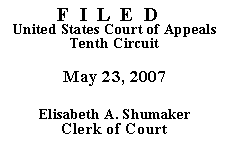

| UNITED STATES OF AMERICA,
Plaintiff-Appellee, v. JESUS ESTRADA-MAGANA, also known as Jesus Leonardo Estrada-Magana, also known as Jeses L. Estrada-Maganna, also known as Jesus Estrada, also known as Jesus Estrada-Emagana, also known as Jorge Lopez, Defendant-Appellant. |
|
Mr. Estrada-Magana pled guilty to that charge. Under the terms of the plea agreement, he waived his right to appeal any sentence imposed upon him on any grounds, except that he did not waive the right to appeal any sentence imposed above the statutory maximum penalty, any sentence imposed with an upward departure from the high end of the Guidelines range, or a sentence that did not reflect the two-level "fast track" reduction recommended by the government. Statement by Def. in Advance of Plea of Guilty at 3. The agreement set forth Mr. Estrada-Magana's understanding that the statutory maximum sentence was ten years' imprisonment, a fine of $250,000 or both, and a term of supervised release of up to thirty-six months. Id. at 1. The district court sentenced Mr. Estrada-Magana to fifteen months' imprisonment, which was below the statutory maximum sentence and at the low end of the sentencing Guidelines.(1) Mr. Estrada-Magana was further placed on supervised release for a term of thirty-six months. Notwithstanding the appeal waiver, he appealed. The government moved to enforce the appeal waiver under United States v. Hahn, 359 F.3d 1315 (10th Cir. 2004) (per curiam) (en banc). For the reasons explained below, we grant the motion and dismiss the appeal.
In Hahn, 359 F.3d at 1325, we held that a waiver of appellate rights will be enforced if (1) "the disputed appeal falls within the scope of the waiver of appellate rights; (2) [] the defendant knowingly and voluntarily waived his appellate rights; and (3) [] enforcing the waiver would [not] result in a miscarriage of justice." Mr. Estrada-Magana concedes that his appeal falls within the scope of the waiver of appellate rights and that he knowingly and voluntarily waived those rights. We therefore need not address these two factors. See United States v. Porter, 405 F.3d 1136, 1143 (10th Cir. 2005) (recognizing that court need not address each Hahn factor if defendant does not raise issue relating to that factor).
Mr. Estrada-Magana argues that enforcement of the plea agreement will result in a miscarriage of justice. Specifically, he contends that
his appeal waiver should not be enforced because of the sentence of 15 months, based solely upon the district court's adoption of the sentencing guideline recommendation, without significant explicit consideration of other sentencing factors listed in 18 U.S.C. § 3355 (sic),(2) including the facts, discussed at the sentencing hearing, that Mr. Estrada-Magana is a parent of two children who live in this country, and returned to this country to care for these children when his wife was unable to care for them because of serious drug use and criminal activity.
Mem. in Opp'n to Mot. to Dismiss at 2.
The miscarriage-of-justice factor requires the defendant to show one of the following: (a) his sentence relied on an impermissible factor such as race; (b) ineffective assistance of counsel in connection with the negotiation of the appeal waiver rendered the waiver invalid; (c) his sentence exceeded the statutory maximum; or (d) his appeal waiver was otherwise unlawful. Hahn, 359 F.3d at 1327. Mr. Estrada-Magana bases his argument solely on the fourth factor. For a fourth category unlawful waiver, the error must "seriously affect[] the fairness, integrity or public reputation of the judicial proceedings." See id. (quotation omitted).
After reviewing the appellate filings, we conclude that Mr. Estrada-Magana has not met his burden to demonstrate that his appeal waiver was unlawful. See United States v. Sandoval, 477 F.3d 1204, 1208 (10th Cir. 2007). Accordingly, we GRANT the government's motion to enforce the plea agreement and DISMISS the appeal. The mandate shall issue forthwith.
ENTERED FOR THE COURT
PER CURIAM
*. This panel has determined unanimously that oral argument would not materially assist the determination of this appeal. See Fed. R. App. P. 34(a)(2); 10th Cir. R. 34.1(G). The case is therefore ordered submitted without oral argument. This order and judgment is not binding precedent, except under the doctrines of law of the case, res judicata, and collateral estoppel. It may be cited, however, for its persuasive value consistent with Fed. R. App. P. 32.1 and 10th Cir. R. 32.1.
1. During the same sentencing proceeding, the district court also sentenced Mr. Estrada-Magana to a concurrent three months and a consecutive three months of imprisonment for violation of the terms of his supervised release. Change of Plea & Sentencing Tr. at 27.
2. The relevant statute is 18 U.S.C. 3553.